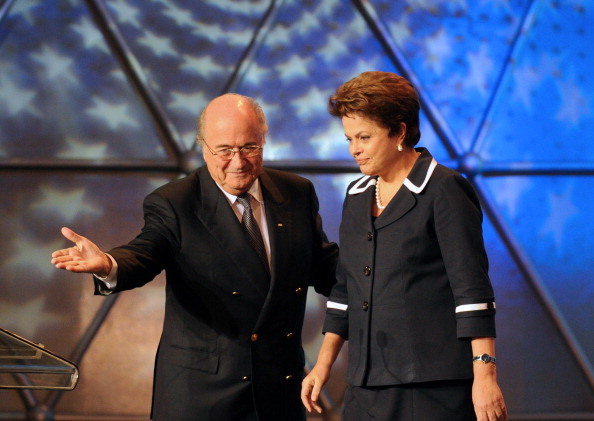By David Gold
October 3 – Brazilian President Dilma Rousseff will meet with FIFA President Sepp Blatter today in Brussels as she looks to discuss a disagreement over a bill in the country’s Congress that could limit the revenues of world football’s governing body.
Brazilian newspaper Estado de São Paulo reported that the two would meet to defuse tensions over restrictions on FIFA which would be created by the new regulations.
Brazil’s Sports Minister Orlando Silva was quoted by the paper as saying that they would meet in Belgium, and indicated that Rousseff is willing to compromise with Blatter.
The bill stipulates penalties of two or three months for those found guilty of infringing trademarks or selling pirate goods, which the paper says FIFA believe to be too lenient, whilst Brazil also want local broadcasters to have limited access to show matches during the tournament, another sticking point with non-rights holders barred from screening World Cup games.
Another issue which will likely be debated is a measure Rousseff has proposed for students and pensioners will be able to attend games for half the price of normal admission costs, which FIFA is thought to be unhappy with.
The relationship between FIFA and Brazil has changed since Rousseff’s election in January, when she replaced the football-loving President Luiz Inácio Lula da Silva.
When winning the right to host the World Cup under his leadership, Brazil agreed to FIFA requirements placed on it in the contract it signed at the time, but Rousseff is determined not to have legislation imposed on her Government.
Relations between Brazil 2014 organisers and FIFA had already been strained as a result of the slow pace of preparations for the World Cup.
The original announcement of host cities was delayed and left to FIFA after Organising Committee chief Ricardo Teixeira refused to make the decision and passed on the responsibility.
Since then, delays in the construction of stadia have threatened to put preparations at risk, with some stadiums not even seeing work beginning until this year.
Already the Itaquera in São Paulo, earmarked for the first match of the tournament and on which construction began just months ago, has been taken off the list for the 2013 Confederations Cup, the dry run ahead of the World Cup, while the iconic Maracanã is still not a certainty to make that tournament.
Upgrading infrastructure also remains well behind schedule, with officials facing a race against time to increase airport capacity in time for 2014.
Rousseff is also planning to introduce significant tax breaks for telecoms companies who invest in new networks in time for the 2014 World Cup in a bid to ensure communications to do not break down during the tournament, Reuters reported.
This investment is designed to help spur a sector in which the two biggest players are Italian and Spanish respectively, with both countries currently suffering amid the growing storm of the European Union debt crisis.
Analysts had warned that Brazil’s networks were at risk of collapse during the World Cup without significant work.
FIFA is pressuring Brazil’s congress to pass a bill announcing the schedule of games for the World Cup by the time of its congress on October 20, but there are growing fears this deadline could be missed.
Contact the writer of this story at zib.l1745118862labto1745118862ofdlr1745118862owedi1745118862sni@d1745118862log.d1745118862ivad1745118862

